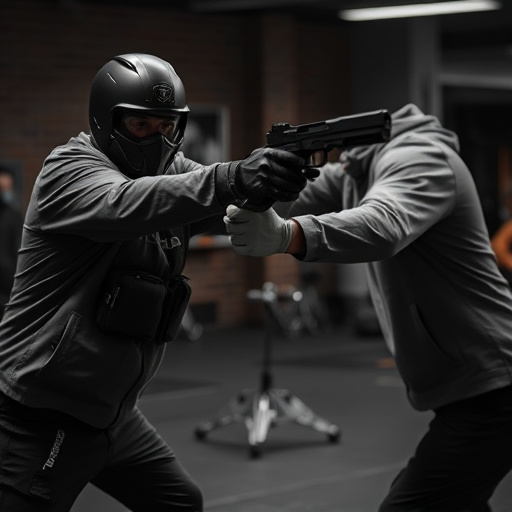Civilian ownership of "lipstick-sized stun guns" has surged, but US state laws vary greatly, requiring careful navigation. Texas and Arizona have relaxed regulations, while New York and California enforce strict permits and training. Understanding these legal nuances is vital for responsible taser possession, as these compact self-defense tools can be classified as weapons with distinct restrictions on storage, transport, and use.
“Uncovering the legal landscape of civilian taser ownership, this article guides you through state-by-state regulations. From understanding the legal perspective of owning a taser to exploring the popularity of lipstick-sized stun guns fit for purses, we delve into the rights and responsibilities that come with such a decision. With varying requirements, knowing your state’s laws is crucial before considering this powerful self-defense tool.”
- Understanding Civilian Taser Ownership: A Legal Perspective
- State-by-State Regulations: Unraveling the Requirements
- Lipstick-Sized Stun Guns for Purse: Are They Legal?
- Rights and Responsibilities of Taser Owners
Understanding Civilian Taser Ownership: A Legal Perspective

Understanding Civilian Taser Ownership: A Legal Perspective
In recent years, there’s been a growing interest in civilian taser ownership, driven by concerns over personal safety. This compact, lipstick-sized stun gun for purse has gained popularity as a non-lethal self-defense tool for women and individuals seeking to enhance their security. However, navigating the legal landscape surrounding taser ownership can be complex, with varying state laws dictating who can possess and under what circumstances these devices are legal.
State regulations differ significantly in terms of permit requirements, registration processes, and restrictions on taser use. Some states allow open carry or concealed carry of tasers without a specific license, while others mandate permits or even registrations for possession. Additionally, certain laws address the age restrictions for taser ownership and usage, as well as guidelines for responsible storage and disposal. Understanding these legal nuances is crucial to ensure compliance and promote safety in civilian taser ownership.
State-by-State Regulations: Unraveling the Requirements

In the United States, the regulations surrounding civilian ownership of stun guns, often referred to as Tasers, vary significantly from state to state. This creates a patchwork of laws that can be confusing for prospective buyers. Understanding these requirements is crucial before considering purchasing a self-defense tool like a lipstick-sized stun gun designed to fit in a purse.
Each state has its own set of criteria, including age restrictions, permit mandates, and specific types of stun guns allowed. Some states, like Texas and Arizona, have relatively relaxed regulations, allowing qualified individuals to carry stun guns without a permit. Conversely, other states, such as New York and California, enforce strict regulations, often requiring permits and specific training certifications for open or concealed carry. Key considerations include the definition of a stun gun (or Taser), the legal criteria for purchase and possession, and any restrictions on where and how these devices can be used. Staying informed about your state’s laws is essential to ensuring compliance and making an informed decision when considering self-defense options like a compact, purse-sized stun gun.
Lipstick-Sized Stun Guns for Purse: Are They Legal?

In recent years, a new trend has emerged in personal defense devices: lipstick-sized stun guns designed to fit comfortably in one’s purse or pocket. These compact self-defense tools have gained popularity due to their portability and ease of use. However, the legality of such devices varies greatly from state to state. Many states have specific regulations regarding stun guns, including restrictions on who can possess them and where they can be carried.
When it comes to lipstick-sized stun guns for purse, it’s crucial to understand that not all states permit their possession without a license or permit. Some states classify these devices as weapons and subject them to the same regulations as firearms, while others may have specific provisions allowing their use by individuals for self-defense. Before considering purchasing one of these handy gadgets, citizens should thoroughly research their state’s laws to ensure compliance and avoid potential legal repercussions.
Rights and Responsibilities of Taser Owners

Taser ownership comes with a unique set of rights and responsibilities that all owners must understand and adhere to. While the ability to carry a lipstick-sized stun gun for purse defense offers a sense of security, it also carries significant legal implications. Owners are responsible for knowing and following local state laws regarding off-duty use, storage, and transport of their stun device. This includes keeping it in a secure location, ensuring only authorized individuals can access it, and using it only as a last resort when facing an imminent threat to personal safety.
Additionally, taser owners must be aware of their rights under the law. They have the right to self-defense, but this right is balanced with the responsibility to use force reasonably and proportionately. Misuse or abuse of a stun gun can lead to legal consequences, including charges of assault or excessive force. Therefore, proper training and understanding of state laws are crucial for any individual considering carrying a lipstick-sized stun gun for personal protection.
In exploring civilian taser ownership, it’s clear that state laws vary significantly. From comprehensive regulations to more lenient guidelines, understanding these requirements is crucial for prospective owners. While devices like lipstick-sized stun guns for purses spark debate due to their compact nature, knowledge of one’s rights and responsibilities is essential regardless of the specific equipment. By staying informed about state-by-state regulations, individuals can make informed decisions while navigating the legal landscape surrounding taser ownership.
